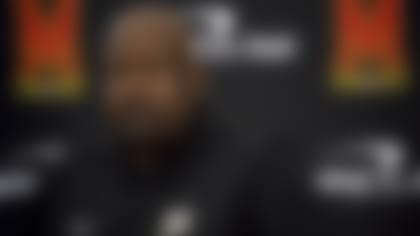Chris Foerster heard it over and over during 60 days of intensive inpatient drug and alcohol treatment: Just replay the tape in your mind.
It's like breaking down game film, as Foerster did hundreds of times over 36 years as a college and NFL assistant coach. Then a video of him snorting cocaine off his desk went viral in October, leading to his resignation as the Miami Dolphins' run game coordinator/offensive line coach and a drive up the coast to West Palm Beach to tackle problems that have followed him most of his adult life.
"I was to the point where I was just praying to God, I want this stuff out," Foerster told me recently, speaking publicly for the first time by phone from the sober living facility in South Florida where he's staying while continuing intensive outpatient treatment.
"Not like exposed, but I want this out of my life. I can't do this anymore. All this s--- I had going on outside of work, I don't want to do this anymore. I don't want to drink anymore. I don't want to use anymore. And sure enough, two weeks later, the video came out. So you can say it's divine intervention. It wasn't the way I saw everything leaving my life like that. But I knew it was coming. At 55 years old, man, I just couldn't do this anymore."
When Foerster replays the tape, that's what he sees: a life gone so out of control it cost him not only his job, but relationships with his family, probably his marriage, his money, everything. He hopes to coach again somewhere; it's the one thing in his life Foerster thinks he did well, a place to get away from his problems, and he believes he'd be a better hire now that he's clean and accountable. Yet even now -- unemployed, alone, living on a diet of salami and canned tuna, in a home where he's drug-tested twice a week and sometimes awoken at midnight to blow into a breathalyzer -- Foerster says: "I've never felt better. I've never been happier. I've never been more clear. I've never been more open to whatever the possibilities are as I am right now today."
Foerster spent his 56th birthday in rehab, where he checked himself in on Oct. 9 -- the same day he signed his resignation with the Dolphins, who funded his treatment. "Nobody really knew" about his addiction, Foerster says. "I kept it a secret." (Several team sources told me the same this week. "Shocked," one fellow assistant coach said.) But Foerster says his alcohol abuse stretches back roughly 30 years. A lot of things came out through therapy about the root cause, Foerster says, but he doesn't want to make excuses. As he got older and long days at the office continued, he found it harder to stay awake after a couple beers, he says. During his second career stint with the San Francisco 49ers -- for one season in 2015 -- he was offered something to keep the party going. Cocaine did the trick, but also "put the accelerator on" his self-destruction, Foerster says.
He met the woman who eventually leaked the infamous video, Kijuana Nige, through a backpage ad while bored in California this past September with the Dolphins, who'd been displaced by Hurricane Irma. They partied together for two days, he says. By the time Foerster made the video in late September, he says he had used cocaine for eight or nine consecutive days and realized upon boarding the team plane to London, where the Dolphins played the Saints on Oct. 1, that he'd done too much.
Foerster says the video preceded a trip to the airport -- not a team meeting, as he said on the tape, which he barely remembers making. "I was so messed up at the time," he says now. Even though he'd sometimes come straight into the office at 4 a.m. from the night out, "I never ran a meeting (high), never at my job, I was never under the influence." In Foerster's drug-twisted logic that day, he wanted to get rid of his stash, stay awake on the plane to get work done and sleep after practice the next day.
Foerster says that was the last time he used cocaine, though that doesn't mean he'd kicked the habit. It was just two weeks later the video came out, and Nige began a mini-media tour in which she said, among other things, that releasing it was a statement against white privilege. (Foerster doesn't dispute Nige's version of events, though he says because of his drug use, he doesn't clearly recall all of their conversations.) Dolphins head coach Adam Gase and a member of the team's security staff spoke with Foerster that night. Foerster showed up for work the next morning and started grading the tape from a win over the Tennessee Titans, but was told to leave while the team sorted things out. When he returned, the team asked Foerster to resign. He asked for a leave of absence, but eventually agreed to a resignation. He says he was in treatment by 7 o'clock that night. A medical records coordinator for HeadWaters at Origins Behavioral HealthCare confirmed Foerster successfully completed the program and was discharged with staff approval Dec. 8.
Foerster's outpatient treatment -- which occurs three to four days a week -- is scheduled to last 24 total days. He's also part of a 12-step program that's active seven days a week; sometimes he goes twice. The NFL says it is not investigating Foerster, but would meet with him to discuss his treatment if he gets another opportunity in the league, and continue to monitor his progress. Though he put Gase and the Dolphins in a terrible spot, Foerster says he has had support from friends in the NFL. Dolphins assistant Clyde Christensen and center Mike Pouncey have voiced support. Hall of Fame coach Tony Dungy, who had Foerster as an assistant with the Buccaneers (from 1996 to 2001) and Colts (in 2002 and '03), has also been in contact, and visited the family that settled in Indianapolis over a decade ago while Foerster continued to move around from job to job, living a life Foerster says even his wife really didn't know about. Foerster has three adult children. His daughter came to see him in treatment, but hasn't spoken to him much since. Neither has his youngest son.
"He feels betrayed, like I'm a big liar," Foerster said. "And I was. I am. I was exposed for the fraud that I am by this woman," Foerster said. "And I've exposed myself. I didn't want to live that life anymore."
When he got to rehab, Foerster recalls, he was asked to list the consequences of his actions.
"The No. 1 consequence for me is I have a chance to fix my life," he said. "I have a chance to get well, I have a chance to get right, I have a chance to get better, I have a chance to try to repair relationships that may be destroyed and ruined for the rest of my life. But I have a chance to get it right, man. And I'm sincere in that.
"Why do I want to coach again? Because I love coaching and helping players. Is that going to be on the high school level? The college level? Is it never going to be again? Then maybe it's never again. I had 25 years in the league and 10 in college. I've been blessed. I made a terrible mistake and I'm responsible for it, and I didn't go to treatment because I wanted to get my job back. I knew this s--- was out of control. It's been the most humbling experience. But it's what I needed."
Follow Tom Pelissero on Twitter @TomPelissero.












